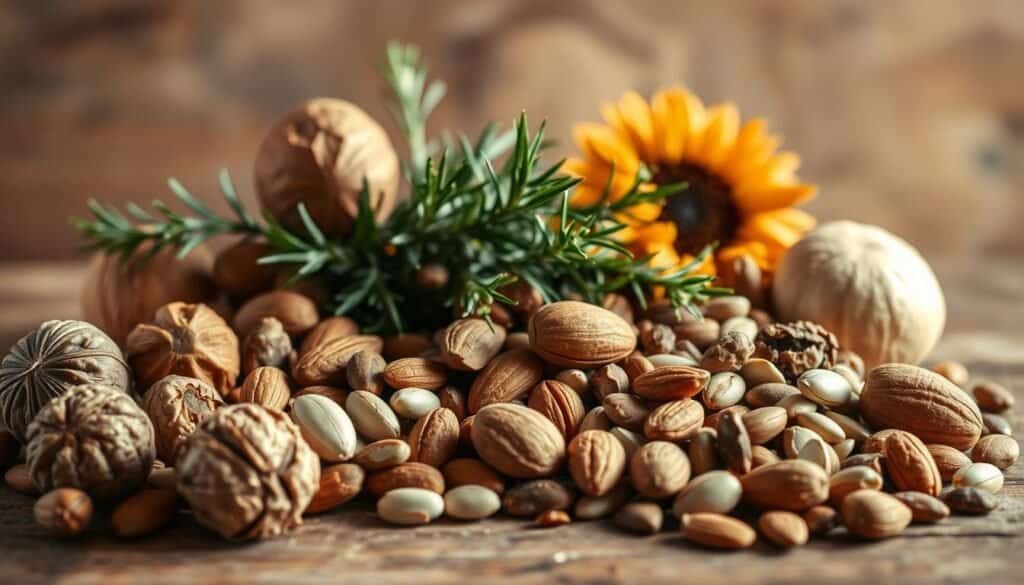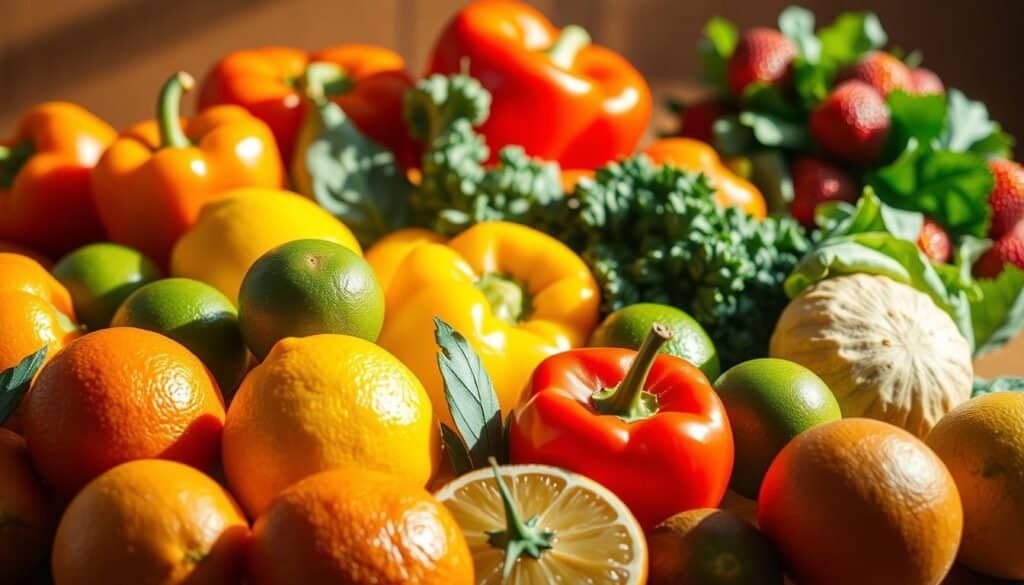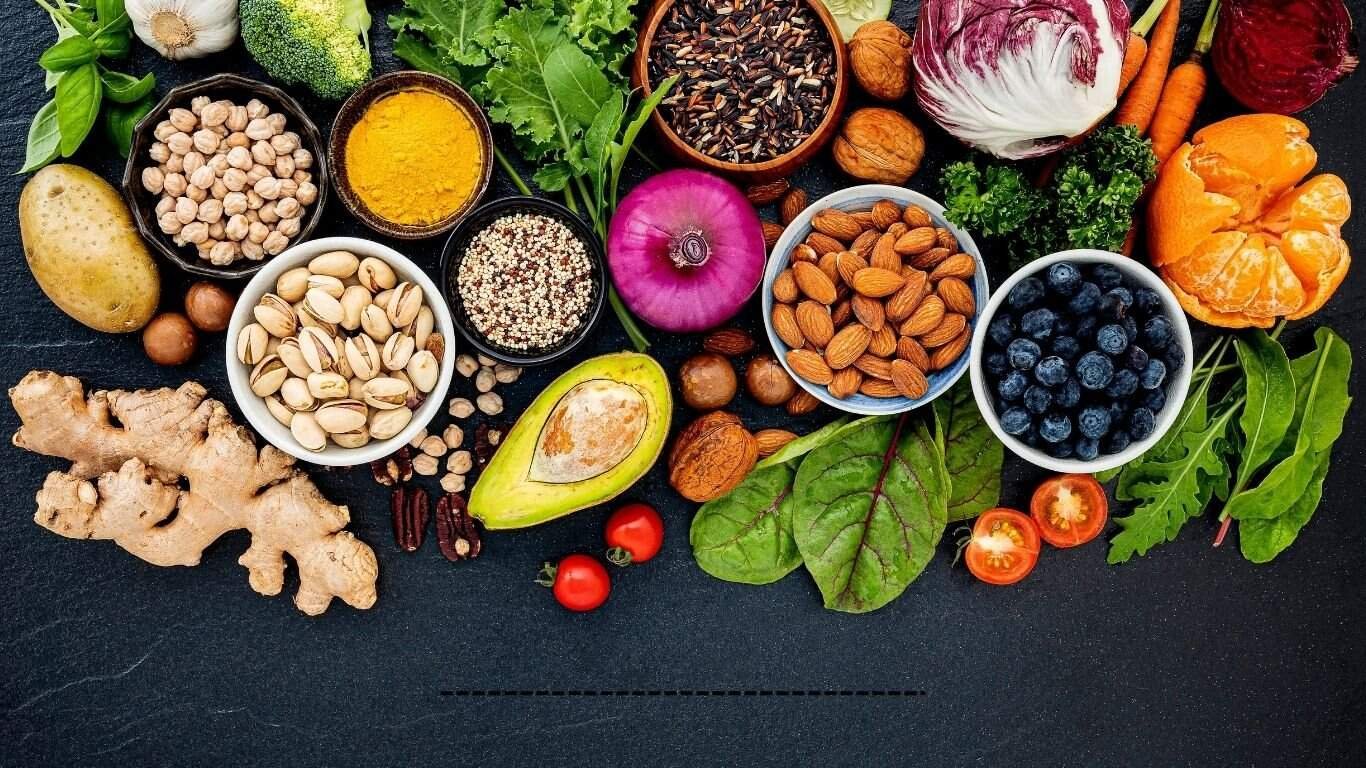Achieving healthy hair is a goal for many, and while there are numerous products on the market claiming to promote hair growth, the truth lies in the food we eat. A well-balanced diet rich in essential nutrients plays a significant role in supporting natural hair growth remedies. Nutritious foods can provide the necessary building blocks for healthy hair, making it stronger and more resilient.
Certain foods are particularly beneficial, offering a natural boost to hair health. By incorporating these into your diet, you can support the growth of luscious locks. In this article, we’ll explore seven such foods that are known to promote hair growth naturally.
Key Takeaways
- Nourishing your body with the right foods can significantly impact hair health.
- A diet rich in essential nutrients supports natural hair growth.
- Certain foods can provide a natural boost to hair health and growth.
- Incorporating these foods into your diet can lead to stronger, healthier hair.
- A well-balanced diet is crucial for achieving healthy hair.
The Science Behind Hair Growth and Nutrition
A well-balanced diet is essential for promoting hair growth and maintaining the overall health of our hair follicles. The relationship between nutrition and hair health is complex, involving various physiological processes.
How Diet Affects Hair Growth Cycles
Hair growth occurs in cycles, and nutrition plays a critical role in these cycles. A diet lacking essential nutrients can lead to hair loss or slow down hair growth. Key nutrients influence the hair growth cycle, including:
- Proteins
- Vitamins (especially Biotin and Vitamin D)
- Minerals (like Iron and Zinc)
Essential Nutrients for Healthy Hair Follicles
For healthy hair follicles, it’s crucial to consume a diet rich in essential nutrients. Nutritional deficiencies can lead to hair-related problems. Some vital nutrients include:
- Omega-3 fatty acids for scalp health
- Vitamin C for collagen production
- Iron for healthy hair follicles
By understanding the science behind hair growth and nutrition, individuals can make informed dietary choices to support their hair health.
Protein-Rich Foods for Stronger Hair Strands
To achieve healthier and stronger hair, it’s vital to include protein-rich foods in your diet. Protein is a fundamental component of hair structure, and consuming enough of it can significantly enhance hair growth and strength.
Eggs: Nature’s Complete Protein Source
Eggs are considered one of the best sources of protein for hair growth. They contain all the essential amino acids that the body needs to build and repair hair follicles. Including eggs in your diet can help strengthen hair strands and promote healthier growth.
Lean Meats and Fish: Amino Acids That Strengthen Hair
Lean meats and fish are rich in amino acids, which are crucial for hair health. Foods like chicken, turkey, and salmon provide the necessary proteins that help in building stronger hair strands. These foods are not only rich in protein but also contain other nutrients that support overall hair health.
Easy Ways to Add More Protein to Your Diet
Adding more protein to your diet can be simple. Here are a few tips:
- Start your day with an egg-based breakfast.
- Incorporate lean meats like chicken or turkey into your meals.
- Add fish like salmon to your weekly meal plan.
- Use protein-rich supplements if you’re struggling to get enough from whole foods.
By making these adjustments, you can ensure you’re getting enough protein to support stronger hair strands.
Omega-3 Fatty Acids: The Scalp Health Promoters
Omega-3 fatty acids are not just beneficial for heart health; they also significantly promote scalp health and hair growth. These essential fatty acids nourish the scalp, promoting healthy hair follicles and reducing inflammation that can lead to hair loss.
Benefits of Fatty Fish
Fatty fish such as salmon and mackerel are rich in omega-3 fatty acids. Consuming these fish can help reduce inflammation on the scalp, promoting a healthier environment for hair growth. The omega-3s in fatty fish also support the health of the hair follicle, potentially reducing the risk of hair loss.
Plant-Based Alternatives
For vegetarians, plant-based sources of omega-3 fatty acids are available. Flaxseeds, chia seeds, and walnuts are excellent sources that can be easily incorporated into the diet. These foods provide alpha-linolenic acid (ALA), a type of omega-3 that supports overall health, including scalp health.
Combating Dry Scalp and Hair Breakage
Omega-3 fatty acids help to combat dry scalp and hair breakage by nourishing the scalp and promoting healthy hair growth. The anti-inflammatory properties of omega-3s reduce irritation and flaking associated with dry scalp, while also strengthening hair strands to prevent breakage.
- Nourishes the scalp for healthier hair follicles
- Reduces inflammation that can lead to hair loss
- Strengthens hair strands to prevent breakage
By incorporating omega-3 rich foods into your diet, you can promote scalp health and support the growth of stronger, healthier hair.
Nuts and Seeds: Vitamin E Powerhouses
Nuts and seeds are not only a tasty snack but also a rich source of vitamin E, essential for promoting hair growth. Vitamin E’s antioxidant properties help protect the hair follicles from damage, supporting a healthy scalp and encouraging hair to grow stronger and longer.
Almonds, Walnuts, and Sunflower Seeds
Among the most beneficial nuts and seeds for hair growth are almonds, walnuts, and sunflower seeds. Almonds are rich in magnesium and biotin, both of which are crucial for hair health. Walnuts are an excellent source of copper, which helps in the production of melanin, the pigment responsible for hair color. Sunflower seeds are packed with vitamin E and selenium, protecting the scalp from damage and supporting the overall health of the hair follicles.

Zinc and Biotin Content for Hair Growth
Nuts and seeds are also a good source of zinc and biotin, two nutrients that are vital for hair growth. Zinc helps in the repair and maintenance of hair tissue, while biotin is crucial for the production of keratin, a protein that makes up hair. A deficiency in either zinc or biotin can lead to hair loss and slow down hair growth.
Simple Snack Ideas Using Hair-Healthy Nuts
To incorporate more nuts and seeds into your diet, try making a trail mix with almonds, walnuts, and sunflower seeds. You can also sprinkle pumpkin seeds over your salad or yogurt for an added crunch and nutritional boost. Another simple snack idea is to make energy balls using nut butter, oats, and honey, then rolling them in chopped nuts for a delicious and healthy treat.
Foods for Hair Growth: Iron-Rich Leafy Greens
Incorporating iron-rich leafy greens into your diet can be a game-changer for promoting healthy hair growth. These nutrient-dense foods are packed with iron, a mineral that’s essential for delivering oxygen to your hair follicles.
Spinach, Kale, and Swiss Chard Benefits
Spinach, kale, and Swiss chard are among the top iron-rich leafy greens that can benefit your hair. Spinach, for instance, is not only rich in iron but also in antioxidants and vitamins that promote overall hair health. Kale is another powerhouse that provides a boost of vitamins A, C, and K, alongside iron. Swiss chard, with its high iron content, supports the health of your scalp, ensuring your hair grows strong and healthy.
How Iron Deficiency Leads to Hair Loss
Iron deficiency is a common nutritional disorder that can lead to hair loss. When your body lacks sufficient iron, it can’t produce enough hemoglobin, a protein in red blood cells that carries oxygen to different parts of your body, including your scalp. Without enough oxygen, your hair follicles become weakened, leading to hair loss. Ensuring you consume enough iron-rich foods can help prevent this condition.
Delicious Ways to Incorporate More Greens
Adding more leafy greens to your diet can be simple and delicious. Here are a few ideas:
- Add fresh spinach to your morning smoothie for a nutrient-packed start.
- Sauté kale with garlic as a side dish, or add it to soups and stews.
- Use Swiss chard in salads or as a sautéed green side dish, seasoned with lemon juice and olive oil.
By incorporating these iron-rich leafy greens into your meals, you’ll not only be supporting your hair’s health but also enhancing your overall well-being.
Vitamin C-Rich Foods for Collagen Production
Incorporating vitamin C-rich foods into your diet can stimulate collagen production, leading to healthier hair. Vitamin C is a vital nutrient that not only boosts the immune system but also plays a significant role in hair health.
Berries, Citrus Fruits, and Bell Peppers
Berries such as strawberries, blueberries, and raspberries are packed with vitamin C. Citrus fruits like oranges, lemons, and grapefruits are also excellent sources. Additionally, bell peppers, especially the red variety, are rich in vitamin C and can be easily incorporated into salads or stir-fries.

Antioxidant Protection Against Hair Damage
Vitamin C acts as a powerful antioxidant that protects hair follicles from damage caused by free radicals. This protection is crucial for maintaining healthy hair growth and preventing hair loss.
Seasonal Fruit Options for Year-Round Hair Health
Eating seasonal fruits ensures that you get a variety of vitamin C-rich foods throughout the year. For example, oranges are abundant in winter, while strawberries are plentiful in spring. Incorporating these seasonal fruits into your diet can provide the necessary vitamin C for optimal collagen production.
Tips for Incorporating Vitamin C-Rich Foods:
- Start your day with a glass of freshly squeezed orange juice.
- Add berries to your breakfast cereal or yogurt.
- Incorporate bell peppers into your meals for a crunchy vitamin C boost.
By making these simple dietary changes, you can enhance collagen production and support healthier hair growth.
Beta-Carotene Foods That Stimulate Hair Growth
Beta-carotene, a precursor to vitamin A, plays a crucial role in promoting healthy hair growth. This antioxidant is found in various colorful fruits and vegetables, making it easy to incorporate into your diet.
Sweet Potatoes, Carrots, and Pumpkin
Sweet potatoes, carrots, and pumpkin are rich sources of beta-carotene. These foods not only add flavor and variety to your meals but also provide essential nutrients for hair health. For instance, sweet potatoes are one of the richest sources of beta-carotene, making them an excellent addition to a hair growth diet.
Vitamin A’s Role in Hair Cell Regeneration
Vitamin A, derived from beta-carotene, is crucial for hair cell regeneration. It helps in the production of sebum, an oily substance that keeps the scalp healthy and promotes hair growth. A deficiency in vitamin A can lead to dry, brittle hair and an itchy scalp.
Cooking Methods That Preserve Nutrients
To maximize the benefits of beta-carotene-rich foods, it’s essential to use cooking methods that preserve these nutrients. Steaming or roasting vegetables like carrots and sweet potatoes can help retain their nutritional value. Avoid overcooking or boiling, as these methods can lead to a loss of vital nutrients.
| Food | Beta-Carotene Content | Cooking Method |
|---|---|---|
| Sweet Potatoes | High | Bake or Roast |
| Carrots | High | Steam or Sauté |
| Pumpkin | Moderate | Roast or Boil (minimally) |
Conclusion: Creating Your Hair-Healthy Eating Plan
A well-balanced diet is crucial for promoting natural hair growth and maintaining healthy hair. By incorporating the foods discussed in this article, you can create a hair-healthy eating plan that supports your hair growth goals.
Start by adding protein-rich foods like eggs, lean meats, and fish to your meals. Include omega-3 fatty acids found in salmon and mackerel, and vitamin E-rich nuts and seeds like almonds and sunflower seeds. Leafy greens such as spinach and kale are also essential for their iron content, while berries and citrus fruits provide vitamin C for collagen production.
To achieve natural hair growth, focus on consuming a variety of whole foods, including sweet potatoes, carrots, and pumpkin, which are rich in beta-carotene. A hair-healthy eating plan is not just about promoting hair growth; it’s also about maintaining overall hair health.
By making informed food choices, you can support your hair’s health and achieve the hair growth you desire. A balanced diet, combined with a healthy lifestyle, is key to unlocking your hair’s full potential.

